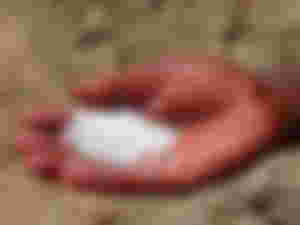Side effects of salt castration on plants
Epsom salt has many benefits for plants. Among other things, increasing nutrient absorption and adding magnesium and sulfur levels to the soil.

However, many people misunderstand the use of salt in plants. You should not give your plants too much epsom salt. Give just a little, because if it is too much, it will have a bad impact.
The following are some of the side effects of giving too much Epsom salt to plants.
1. Withered plant
Excess Epsom salt can cause plants to wilt. This is because it is salt and will make it harder for plants to take up water. So, the more Epsom salt you add to the soil, the more the plants will suffer. In addition, too much Epsom salt in the soil will drain water from plant cells.
If you believe your plant is deficient in magnesium, you can add Epsom salt to the soil, but in the right amount. Also, this is more true in potted plants than in the garden.
However, the best way to add nutrients to your soil is to get rid of infertile soil and replace it with fertile soil. In addition, you can use mulch that is natural and does not harm the plant.
2. Causes an imbalance of nutrients in the soil
You definitely want to have soil with balanced nutrition. Such soil is good for growing all kinds of crops. However, adding too much Epsom salt will do more harm than good.
This is because it will directly create an imbalance of nutrients in the soil. Too much magnesium in the soil will damage the plant. Therefore, you will damage the plant instead of enhancing it.
Moreover, excessive use of magnesium sulfate in the soil has been associated with reduced root colonization of important microbes such as nitrogen fixing bacteria.
3. The tip of the flower will rot
There is an ongoing debate about epsom salt as to whether or not it can prevent flower tip rot. The truth is that it doesn't help to end this problem in tomatoes.
This is because flower tip rot is a calcium deficiency in the tomato fruit and not a magnesium deficiency. So the more you add epsom salt to the soil, the more you add magnesium, which may compete with calcium absorption and cause more harm than good.
Therefore, adding too much epsom salt will cause flower tip rot to get worse rather than better. The best way to end flower rot is with mulch and regular irrigation. Make sure the plant gets the right amount of moisture and has the nutrients it needs to grow.
4. Dead plants
In a worst-case scenario, adding too much epsom salt can cause the plant to die. Before adding epsom salt, you should find out what nutrients are needed and in what portions. For example, soil should have 10 times more calcium than magnesium.
So if you add Epsom salt, make sure it is 10 times more calcium or add calcium to match this ratio. If you fail to do so, the plant will suffocate, meaning it will not absorb calcium. The more magnesium in the soil, the less calcium there is.
Both compete for absorption, and that's why they need to be in the right ratio all the time. It's okay for some plants to have less magnesium, but not more.
5. Removing aluminum from the ground
Adding too much Epsom salt to the soil can release aluminum from the soil. Aluminum is a metal that is toxic to plants and even living organisms that live in the soil. Aluminum toxicity in plants makes root tip cells stop root development. As a result, your plants may stop growing or even die. In addition, aluminum causes a reduced intake of water and nutrients by plants.
6. Burning leaves
If you spray diluted epsom salts on plant leaves, they will burn the leaves, make the plant susceptible to disease, and attract pests to the garden. For that, you should not apply Epsom salt solution on plant leaves. It doesn't matter whether the solution is highly concentrated or not, you don't have to apply it to the leaves.
And that's a side effect and a thing to watch out for if you give your plants too often water with a mixture of salt. Better to use manure or just sprinkle water without any mixture on your plants and it will be better.
